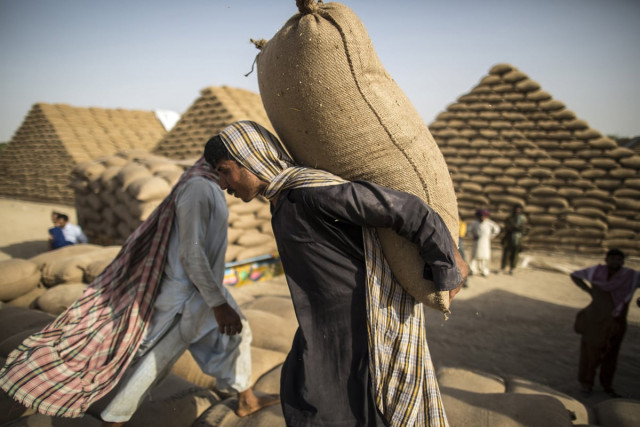ECC: Govt imposes 25% regulatory duty on import of wheat, related products
ECC approves new National Aviation Policy. Finance Minister Ishaq Dar says incentives will be announced in next budget

The step is aimed at sparing Chinese investors from the adverse impact of crippling circular debt. PHOTO: REUTERS
The decision was taken by the Economic Coordination Committee (ECC) of the Cabinet that also approved a mechanism to give special treatment to Chinese investors setting up coal-based power plants under the China Pakistan Economic Corridor. The step is aimed at sparing Chinese investors from the adverse impact of crippling circular debt and facilitating the finalisation of financing agreements for these projects in Beijing next week.
Under the policy, a revolving fund will be established, which will have cash sufficient to pick up the 22% monthly electricity purchase cost. At present, roughly 80% of the electricity bills are recovered, while the rest are accounted into the circular debt. China had refused to setup power plants till the government provides guarantees.
Now, power projects setup under the Pakistan-China Economic Corridor will get the cost of electricity from this revolving fund.
“The finance ministry would guarantee to fund such revolving account in case the power purchaser failed to place or maintain the required funds in such account”, according to an official handout.
The ECC also authorised Private Power Infrastructure Board to make and approve project-specific amendments in the standardised coal security package documents required during negotiations, provided the obligations or liabilities were not adversely affected.
Wheat regulatory duty
While lifting ban on the import of wheat products, the ECC imposed 25% regulatory duty on import of wheat and wheat products, making it financially unviable to import the commodity. In the international market, wheat was available at Rs25.12 per kg – a rate, which is 40% lower than the domestic price of Rs35.73, according to statistics compiled by the Pakistan Bureau of Statistics for the domestic market.
Independent economists have been criticising the government’s decision of denying domestic consumers the benefits of reduced commodity prices. Instead, “the government is providing subsidy to international consumers by giving subsidies worth billions of rupees on export of wheat,” said former Finance Minister Dr Hafiz Pasha.
The decision to impose duties was taken to support local farmers, who had been adversely affected by decreasing international wheat prices, said Finance Minister Ishaq Dar.
The ECC also gave one month extension on export of 1.2 million tonnes of wheat by Punjab and Sindh. The new cut-off date for Sindh will now be April 30, and for Punjab it will be May 15.
The ECC also allowed arranging finances for procuring 6.6 million tonnes of wheat by four provinces and Pakistan Agriculture Storage and Supply Corporation. For the procurement, it allowed to arrange Rs222 billion. The decision will increase the commodity liabilities as the provinces are struggling to retire their previous debts.
The ECC also gave consent for the provision of another 40,000 metric tonnes of wheat to the United Nations World Food Programme for the temporarily displaced persons of North Waziristan Agency and Khyber Pakhtunkhwa.
It imposed 12.5% regulatory duty on import of hot rolled products, pipes and all such imported items aimed at protecting the domestic industry.
Aviation policy
The ECC approved the National Aviation Policy 2015 aimed at turning the aviation sector into a truly vibrant sphere of the economy. Under the new policy, smaller aircrafts would provide air travel services between smaller cities. Cargo facilities will be enhanced and cargo villages established in Northern and Southern parts of the country. With the new aviation policy the current capacity of handling 130,000 metric tonnes of cargo will be doubled.
The ECC did not approve tax incentives for the aviation sector, which will be separately considered in the upcoming budget.
“In the next budget, we will be announcing incentives for the aviation sector in line with the new Policy,” Dar was quoted as saying.
The ECC also approved 96 million for payment of three months’ salary to employees of the Pakistan Machine Tool Factory (PMTF) Karachi.
The ECC approved the Standardised Project Agreements for Solar Energy Based Projects under the policy for Development of Renewable Energy for Power Generation. It authorised Alternate Energy Development Board to make any project specific amendments in these standardised project Agreements for Solar Power projects as required during negotiations that do not increase the government’s liabilities beyond those stipulated in the said project agreements.



















COMMENTS
Comments are moderated and generally will be posted if they are on-topic and not abusive.
For more information, please see our Comments FAQ